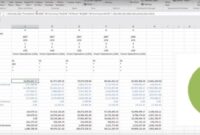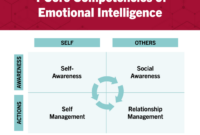Embark on a journey of data mastery with a business intelligence certificate, the key to unlocking a world of opportunities in today’s data-driven landscape. Dive into the fundamentals of business intelligence, explore its transformative applications, and equip yourself with the skills to harness data for strategic decision-making.
From data analysis to visualization and practical project experience, our comprehensive guide covers everything you need to know about business intelligence certificates. Discover the career paths that await you, the industries eager for your expertise, and the criteria for selecting the perfect program to propel your career forward.
Overview of Business Intelligence Certificate Programs
Business intelligence (BI) is the process of gathering, analyzing, and presenting data to help organizations make informed decisions. In today’s data-driven business environment, BI is more important than ever before. A BI certificate program can provide you with the skills and knowledge you need to become a successful BI professional.
Benefits of Obtaining a BI Certificate
- Increased earning potential: BI professionals are in high demand, and they command higher salaries than those without a BI certificate.
- Career advancement opportunities: A BI certificate can help you advance your career by providing you with the skills and knowledge you need to take on more senior roles.
- Improved job security: In a competitive job market, a BI certificate can give you an edge over other candidates and help you secure a stable job.
Types of BI Certificate Programs Available
- Online BI certificate programs: These programs are offered entirely online, making them a convenient option for busy professionals.
- On-campus BI certificate programs: These programs are offered at traditional colleges and universities, and they provide students with the opportunity to learn from experienced professors and network with other students.
- Hybrid BI certificate programs: These programs combine online and on-campus learning, giving students the flexibility to learn at their own pace and on their own schedule.
Curriculum and Coursework
The curriculum for a BI certificate program typically includes a combination of core courses and elective courses. Core courses typically cover the following topics:
Core Courses, Business intelligence certificate
- Data analysis
- Data visualization
- BI tools
- Data mining
- Data warehousing
Elective courses allow students to specialize in a particular area of BI, such as:
Elective Courses
- Advanced data analysis
- Big data analytics
- Predictive analytics
- Data governance
- Data ethics
Hands-on Projects and Practical Experience
In addition to coursework, many BI certificate programs also include hands-on projects and practical experience. This is important because it allows students to apply the skills they are learning in a real-world setting.
Earning a business intelligence certificate can open doors to a lucrative career as a business intelligence analyst. These professionals use data analysis to help businesses make informed decisions, leading to increased efficiency and profitability.
The skills acquired through a business intelligence certificate provide a solid foundation for success in this in-demand field.
Career Opportunities and Industry Applications

Individuals with a BI certificate have a wide range of career opportunities available to them. They can work as BI analysts, data analysts, data scientists, and data engineers. BI professionals are in high demand in a variety of industries, including:
Industries Where BI Professionals Are in High Demand
- Financial services
- Healthcare
- Retail
- Manufacturing
- Technology
BI is used in a variety of ways across different industries. For example, in the financial services industry, BI is used to analyze financial data and identify trends. In the healthcare industry,
BI is used to track patient data and improve patient outcomes. In the retail industry, BI is used to analyze customer data and improve marketing campaigns.
Earning a business intelligence certificate is a great way to kickstart your career as a business intelligence analyst. If you’re interested in learning more about how to become a business intelligence analyst, I recommend checking out this comprehensive guide: How to Become a Business Intelligence Analyst.
This guide covers everything you need to know, from the skills and education you need to the job market and salary expectations. Once you’ve completed your certificate program and gained some experience, you’ll be well on your way to a successful career in business intelligence.
Choosing the Right BI Certificate Program
When choosing a BI certificate program, there are a few factors to consider, including:
Factors to Consider When Choosing a BI Certificate Program
- Program reputation: Do some research to find out which BI certificate programs are the most reputable.
- Curriculum: Make sure that the program’s curriculum covers the topics that you are interested in.
- Cost: Consider the cost of the program and make sure that it fits into your budget.
- Location: If you are interested in an on-campus program, make sure that the location is convenient for you.
- Flexibility: If you are a busy professional, make sure that the program offers flexible learning options.
Once you have considered these factors, you can start to narrow down your choices and choose the BI certificate program that is right for you.
Preparation and Application Process
The application process for a BI certificate program typically includes the following steps:
Application Process

- Submit a completed application form.
- Submit official transcripts from all colleges and universities attended.
- Submit a resume.
- Submit a letter of recommendation.
- Interview with the program director.
Once you have completed the application process, you will be notified of the program’s decision. If you are accepted into the program, you will be required to pay a deposit to secure your spot.
Tips for Preparing a Strong Application
- Highlight your relevant skills and experience.
- Tailor your resume and cover letter to the specific program you are applying to.
- Practice your interviewing skills.
Additional Resources and Industry Trends

There are a number of resources available to help you learn more about BI certificate programs. These resources include:
Resources
- The Association for Business Intelligence (ABI)
- The Data Management Association (DAMA)
- The Institute for Business Analytics (IBA)
In addition to these resources, there are a number of industry trends that you should be aware of. These trends include:
Industry Trends
- The growing use of big data
- The increasing popularity of cloud-based BI solutions
- The rise of self-service BI
- The growing importance of data ethics
By staying up-to-date on these trends, you can ensure that you are well-prepared for a successful career in BI.
To master the intricacies of business intelligence, a certification is invaluable. Explore the comprehensive resources at blog.dosenpintar.com business intelligence , a treasure trove of knowledge for BI professionals.
Their insights will empower you to harness data effectively, driving informed decision-making and unlocking business growth.
Closure: Business Intelligence Certificate
With a business intelligence certificate, you’ll become a data-driven professional, capable of extracting insights from vast amounts of information. Whether you’re a seasoned analyst or a curious professional seeking to advance your career, this certification will empower you to make informed decisions, drive innovation, and shape the future of your organization.




